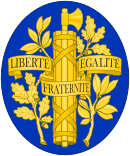
Back الانتخابات الرئاسية في فرنسا Arabic Dilennadeg prezidant ar Republik c'hall Breton Präsidentschaftswahl in Frankreich German Prezidentaj balotoj en Francio Esperanto Ranskan presidentinvaalit Finnish Élection présidentielle en France French הבחירות לנשיאות צרפת HE フランス大統領選挙 Japanese 프랑스의 대통령 선거 Korean Franse presidentsverkiezingen Dutch
 |
|---|
 |
|---|
| Constitution |
|
|
The president of France (ex officio also a co-prince of Andorra) is elected by direct popular vote to a five-year term. If the office falls vacant before the end of five years, an election to a new five-year term is held, generally within 20 to 35 days of the vacancy. Presidents may serve at most two consecutive terms.[1]
The presidential term was set at five years beginning with the 2002 election.[2] In elections held from 1965 until 1995, the president was elected to a seven-year term.[3][4][5][6] Elections are always held on a Sunday.[7] Candidates appear on the ballot after the Constitutional Council has validated their candidacy. Should no candidate receive over 50% of the vote in the first round, a second round is organised two weeks later with the top two contenders.
Candidates in presidential elections in France have the right to visit French military bases on national soil and abroad to gain a better understanding of the French Armed Forces, although they are prohibited from using such visits for campaign events.[8] Depending on their respective results in the election, they are eligible to different modalities of reimbursement of their campaign expenses by the state.[9] The state also monitors appearances on television and radio programmes through its Regulatory Authority for Audiovisual and Digital Communication (ARCOM) to ensure equal airtime between candidates during the campaign; each candidate has the right to a certain amount of time not to be exceeded per media platform.[10]
- ^ "The Constitution of the Fifth Republic (in English)". Elysee.fr. 14 December 2022. Retrieved 12 June 2024.
- ^ Duhamel, Olivier (1 March 2001). "France's New Five-Year Presidential Term". Brookings Institution. Retrieved 12 June 2024.
- ^ "France at the Polls: The Presidential Election of 1974". AEI. 2017-07-29. Retrieved 2017-04-23.
- ^ William G. Mayer (2004). The Making of the Presidential Candidates 2004. Rowman & Littlefield. pp. 266–. ISBN 978-0-7425-2919-9.
direct vote France since 1965.
- ^ Robert Wistrich (2 September 2003). Terms of Survival: The Jewish World Since 1945. Routledge. pp. 226–. ISBN 978-1-134-85579-7.
- ^ Dennis C. Mueller (17 February 2003). Public Choice III. Cambridge University Press. pp. 433–. ISBN 978-0-521-89475-3.
- ^ "When is the French Presidential Election 2017, how does it work and who are the candidates?". The Telegraph. 2017-04-22. Retrieved 2017-04-22.
- ^ "Visite critiquée en Côte d’Ivoire : Zemmour dit avoir respecté «scrupuleusement» les conditions exigées", Le Parisien (in French), 24 December 2021.
- ^ "Quels sont les seuils de remboursement des frais de campagne ?, Constitutional Council of France via presidentielle2022.conseil-constitutionnel.fr.
- ^ "Présidentielle : comment le temps d’antenne des candidats est-il calculé ?", Ouest-France (in French), 28 March 2022.
© MMXXIII Rich X Search. We shall prevail. All rights reserved. Rich X Search